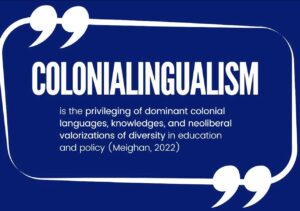This month’s feature comes from critical sociolinguist and Hub member Paul J. Meighan. His text introduces us to the notion of “colonialingualism,” which Paul developed in his 2022 article entitled “Colonialingualism: colonial legacies, imperial mindsets, and inequitable practices in English language education.”
The languages implemented in mainstream education predominantly reflect the knowledge and belief systems of dominant, nation-state, official, and colonial languages as opposed to those of endangered and Indigenous languages. The privileging of dominant colonial knowledges, languages, and neoliberal valorizations of diversity in education and policy is Colonialingualism (Meighan, 2022).
Colonialingualism, covertly or overtly, upholds colonial legacies, imperial mindsets, and inequitable practices. Colonial languages carry colonial legacies and can perpetuate an imperialistic and neoliberal worldview. Languages can be disembodied from place and commodified as mere “resources”, important only for economic “value” rather than cultural importance, in a “modern” global, neoliberal empire.

Colonialingualism resides in the “epistemological error” in dominant thought, characterized by linguistic imperialism and cognitive imperialism; the view that humans are superior to nature; and white (epistemological) supremacy. This “epistemological error” (Bateson, 1972) dominates the current mainstream western worldview, institutions, pedagogies, mindsets, and ways of languaging. Colonialingualism is subtractive and detrimental to multilingual, multicultural learners’ identities and heritages; endangered, Indigenous languages and knowledges; minoritized communities; and our environment.
Colonialingual ideologies and pedagogies
Human exceptionalism, imbalances, and injustices have led to, and uphold, colonialingual ideologies and pedagogies in mainstream (English) education. Present-day colonialingual ideologies and pedagogies include, but are not limited to:
- Monolingual and monocultural learning environments, such as English-only classrooms with ethnocentric, white “native-speaker” materials (e.g., Kubota, 2020)
- Decontextualized, disembodied language-as-resource, language-as-code tasks, such as acultural, ahistorical comprehension activities (e.g., Macedo, 2019)
- Privileging the western print canon and “standard” forms of language, such as an idealized, upper middle class, homogenous language (e.g., Phyak, 2021)
- Deprivileging land- or place-based education, community, “vernacular” language forms and visual/aural/semiotic literacies and repertoires (e.g., Kusters et al., 2017; Leonard, 2017)
- Extractive western research paradigms/methods, such as positivist, “objective” research on, not with or by Indigenous and minoritized peoples (e.g., Smith, 2021; Battiste, 2013), and
- Physical, mental punishment and violence for speaking a heritage and/or Indigenous language (e.g., Smith, 2021; Chiblow & Meighan, 2021; Battiste, 2013).
Colonialingualism transmits imperial mindsets, knowledges, and belief systems through the teaching and learning of languages. Colonialingual ideologies influence how we language, the categorizations we use, what we value, and how we relate to each other, the environment, and the more than human.
You can read more about Colonialingualism in this open-access article.
References
Bateson, G. (1972). Steps to an ecology of mind. Chandler.
Battiste, M. (2013). Decolonizing education: Nourishing the learning spirit. Purich.
Chiblow, S., & Meighan, P. J. (2021). Language is land, land is language: The importance of Indigenous languages. Human Geography, 15(2), 206–210. https://doi.org/10.1177/19427786211022899
Kubota, R. (2020). Confronting epistemological racism, decolonizing scholarly knowledge: Race and gender in applied linguistics. Applied Linguistics, 41(5), 712–732. https://doi.org/10.1093/applin/amz033
Kusters, A., Spotti, M., Swanwick, R., & Tapio, E. (2017). Beyond languages, beyond modalities: Transforming the study of semiotic repertoires. International Journal of Multilingualism, 14(3), 219–232. https://doi.org/10.1080/14790718.2017.1321651
Leonard, W. Y. (2017). Producing language reclamation by decolonising language. Language Documentation and Description, 14, 15–36. http://www.elpublishing.org/PID/15
Macedo, D. (Ed.). (2019). Decolonizing foreign language education: The misteaching of English and other colonial languages. Routledge.
Meighan, P. J. (2022). Colonialingualism: Colonial legacies, imperial mindsets, and inequitable practices in English language education. Diaspora, Indigenous, and Minority Education, 17(2), 146-155. https://doi.org/10.1080/15595692.2022.2082406
Phyak, P. (2021). Epistemicide, deficit language ideology, and (de)coloniality in language education policy. International Journal of the Sociology of Language, 267-268, 219–233. https://doi.org/10.1515/ijsl-2020-0104
Smith, L. T. (2021). Decolonizing methodologies: Research and Indigenous peoples (2nd ed.). Zed Books.
